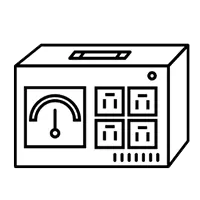Quando precisa de fornecer uma carga monofásica, mas já possui uma unidade trifásica, é tentador reequipar e não gastar dinheiro na compra de um novo transformador monofásico. Na maioria dos casos é possível - mas apenas se utilizar boas práticas de redução, proteção e cablagem.
I. Porquê utilizar um transformador trifásico para monofásico?
Maximizar os activos existentes
É possível que já tenha um transformador trifásico de reserva à mão - reciclá-lo poupa o custo e o tempo de espera de uma nova unidade.
Utilização temporária ou de emergência
Em caso de reparação temporária ou de paragem, o retrabalho de uma máquina trifásica pode colocar o equipamento crítico em funcionamento.
Ajuste da tensão de alta capacidade
Um transformador buck boost é ótimo para pequenos ajustes de tensão, mas um núcleo trifásico é capaz de um maior ajuste de tensão monofásica quando corretamente ligado.
II. Noções básicas de um transformador trifásico
Arranjo de enrolamento
Três enrolamentos monofásicos iguais em Δ (delta) ou Y (estrela) fornecem uma saída trifásica equilibrada.
Capacidade nominal
Definido em kVA para funcionamento trifásico completo - a saída monofásica deve ser reduzida.
Utilizações comuns
Motores industriais, grandes unidades UPS e painéis de distribuição comerciais.
III. Métodos de religação da saída monofásica
1. Ligação em triângulo aberto
Como funciona: Utilizar dois dos enrolamentos delta; deixar o terceiro enrolamento ao ralenti.
Capacidade disponível: ≈ 57% do kVA trifásico original.
Ideal para: Cargas ligeiras ou cargas temporárias (por exemplo, alimentação de instrumentos, ferramentas temporárias).
2. Wye-Tap (derivação fase-neutro)
Como funciona: Ligar uma perna da fase e o ponto neutro numa configuração em Y.
Capacidade disponível: ≈ 33% do kVA original.
Ideal para: Pequenos circuitos de controlo, luzes e auxiliares.
IV. Comparação de prós e contras
| Aspeto | Vantagens | Desvantagens |
|---|---|---|
| Utilização de custos | - Evita a compra de um novo transformador monofásico - Utiliza o ativo existente | - Preço do transformador trifásico é mais elevado à partida - Trabalho de cablagem adicional |
| Capacidade e eficiência | - Saída estável se for reduzida corretamente - Perdas de núcleo semelhantes às da unidade dedicada | - Deve ser reduzida para 50-60% kVA - O fluxo não equilibrado pode aumentar as perdas |
| Flexibilidade | - Pode reverter para serviço trifásico mais tarde | - Cablagem mais complexa - Requer proteção e rotulagem actualizadas |
V. Considerações práticas fundamentais
Derivação adequada
Utilize um transformador de, pelo menos, 1,7 × a sua carga monofásica.
Exemplo: Uma unidade trifásica de 30 kVA → ~17-18 kVA de saída monofásica.
Balanceamento de bobinas
Alterne o par de fases que utiliza em corridas longas para distribuir o stress térmico.
Actualizações de proteção
Redimensionar os disjuntores ou fusíveis para igualar a corrente maior nos enrolamentos com derivação.
Rotulagem clara
Coloque uma etiqueta com os dizeres "Torneira monofásica" e "Neutro" no transformador e no painel para evitar erros de ligação.
VI. Alternativas mais seguras e mais eficientes
Transformador monofásico dedicado
Ideal para cargas residenciais ou comerciais ligeiras; o custo do transformador monofásico é geralmente mais baixo, mais eficiente em potências baixas de kVA.
Transformador monofásico para trifásico (Conversor de fase)
Altera a entrada monofásica para a saída trifásica dos motores:
Conversores estáticos: Fácil e económico para serviço intermitente.
Conversores rotativos: Saída de potência total para serviço contínuo do motor.
Acionamento de frequência variável (VFD)
Oferece conversão de fase e controlo de velocidade - ideal para máquinas que necessitam de elevado desempenho.
VII. PERGUNTAS FREQUENTES
Sim - se reduzir adequadamente a potência, modernizar as protecções e etiquetar todos os terminais. Contrate sempre um eletricista especializado.
Não. As perdas inactivas podem aumentar devido a um fluxo magnético desequilibrado. O transformador monofásico, concebido para o efeito, é mais adequado para cargas longas e leves.
Um transformador buck boost compensa a tensão ±10-20% em circuitos monofásicos. É pequeno e barato para pequenas correcções, mas não para cargas pesadas.
O preço dos transformadores monofásicos de nível de entrada (5-15 kVA) começa normalmente nas centenas de dólares.
O preço dos transformadores trifásicos (30 kVA e superior) começa normalmente em meados da centena e aumenta rapidamente com a capacidade.
VIII. Conclusão
O reaproveitamento de um transformador trifásico para utilização monofásica pode ser uma solução inteligente a curto prazo ou de emergência. No entanto, para uma eficiência a longo prazo, fiabilidade e cablagem conveniente, um transformador monofásico ou um transformador monofásico para trifásico (conversor de fase ou VFD) é normalmente o melhor investimento. Verifique sempre os códigos eléctricos locais e peça a um profissional para garantir uma instalação segura e em conformidade com os códigos
Produtos relacionados
25kva Transformador de distribuição monofásico montado em poste 13.2KV a 240V
Transformador de potência de distribuição de resina epóxi de tipo seco 33kv 35kv
SCB11 11KV Transformador de distribuição trifásico a seco em resina fundida
SCB10 Transformador trifásico de tipo seco com isolamento de resina para vazamento 11Kv 15Kv 33Kv 33Kv 630-3150Kva
Será utilizado em conformidade com o nosso Política de privacidade










